
Introduction
With stricter immigration enforcement expected under the Trump Administration, businesses must prioritize I-9 and E-Verify compliance to avoid audits, fines, and operational disruptions. Many companies are unknowingly non-compliant, making it essential to review and correct I-9 processes now.
What to Expect Under the Trump Administration
Increased Immigration Enforcement: One of the hallmarks of the Trump administration was a stronger focus on immigration enforcement. This translated into more rigorous scrutiny of I-9 compliance and greater emphasis on ensuring that businesses were not hiring undocumented workers.
- I-9 Audits: The U.S. Immigration and Customs Enforcement (ICE) significantly ramped up workplace audits of I-9 forms. ICE is expected to ramp up workplace inspections. Employers are more likely to face audits to ensure that they were properly verifying the eligibility of their employees to work in the U.S.
- Fines and Penalties: As part of the increased enforcement, fines for I-9 violations also became steeper. Civil penalties for non-compliance, such as failing to complete I-9 forms or making errors in documentation, are more aggressively pursued.
- What Employers Should Expect:
Tighter Scrutiny: Employers could expect more frequent audits from ICE and higher penalties for non-compliance. Employers needed to be more diligent in maintaining their I-9 forms and ensuring they were completed correctly.
- Civil and Criminal Violations for Form I-9 and Immigration-Related Employment Discrimination Civil Violations:
- Knowingly hired, or to have knowingly recruited or referred for a fee, an unauthorized alien for employment in the United States or to have knowingly continued to employ an unauthorized alien in the United States.
- Failing to comply with Form I-9 employment verification requirements.
- Committing or participating in document fraud for satisfying a requirement or benefit of the employment verification process or the INA.
- Committing document abuse.
- Unlawful discrimination against an employment-authorized individual in hiring, firing, or recruitment or referral for a fee.
- Failing to notify DHS of a Final Non confirmation (FNC) of an employee’s employment eligibility.
- Requiring an individual to post a bond or security or to pay an amount or otherwise to provide financial guarantee or indemnity against any potential liability arising under the employment verification requirements.
- Criminal Violations: Engaging in a pattern or practice of hiring, recruiting or referring for a fee unauthorized alien.
- Targeted Raids: Industries like construction, hospitality, agriculture, and food processing will face heightened scrutiny.
Key Steps for I-9 Compliance:
- Use The Correct Form I-9: Always use the latest USCIS-approved version.
- Complete Forms Accurately: Ensure all fields are filled correctly within three business days of hire.
- Verify & Retain Documents: Only retain required documents, especially if participating in E-Verify.
- Monitor Temporary Work Visas: Track expiration dates and complete Section 3 for reverifications.
- Avoid Unauthorized Hires: Review work authorization documents carefully to prevent violations.
- Ensure Clear Communication: Train employees on I-9 requirements and acceptable documentation.
- Conduct Regular I-9 Audits: Correct errors properly and document changes.
Employer Responsibilities:
- Retain I-9 Forms Properly – Store them for at least three years from the hire date or one year after termination, whichever is longer.
- Stay Updated on Regulations – USCIS and DHS frequently update I-9 requirements.
- Prepare for Audits or Raids – Have a compliance response plan and ensure HR teams know how to respond.
Why Compliance Matters Now
With the administration’s renewed focus on immigration enforcement, non-compliance could mean severe fines, workforce disruptions, and reputational damage. Businesses must take proactive steps now to ensure compliance and avoid penalties.
Conclusion
I-9 compliance is not optional — it’s a legal necessity. Regular audits, proper training, and clear documentation practices are key to avoiding fines and ensuring smooth operations.
At Abel HR, we help businesses stay compliant with expert HR support, regulatory guidance, and audit preparation. Contact us today to protect your business from compliance risks.

